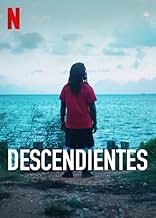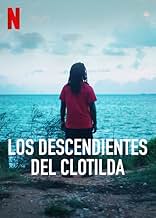NOTE IMDb
7,1/10
1,5 k
MA NOTE
Des descendants d'esclaves emmenés illégalement en Alabama en 1860 sont en quête de réponses et de justice après la découverte de l'épave du navire ayant transporté leurs ancêtres.Des descendants d'esclaves emmenés illégalement en Alabama en 1860 sont en quête de réponses et de justice après la découverte de l'épave du navire ayant transporté leurs ancêtres.Des descendants d'esclaves emmenés illégalement en Alabama en 1860 sont en quête de réponses et de justice après la découverte de l'épave du navire ayant transporté leurs ancêtres.
- Réalisation
- Scénario
- Casting principal
- Récompenses
- 7 victoires et 24 nominations au total
Avis à la une
I found this to be a fascinating documentary, that held my attention throughout.
That said, it left me with some unanswered questions, in part because of its format, which focused on interviews with people who lived in Africatown, near where the Clotilda, evidently the last slave ship to arrive in the United States, landed.
I can completely understand why the director and producer would want to give these people a chance to express their views and feelings. They had been ignored for so long.
And I know that documentaries can only be so long before viewers start to turn out and off.
But I would have liked more background about a variety of issues. Do we know anything about the Clotilda's route to the States? Do we know where in Africa it left from? Have any of the descendants taken DNA tests that would help with this?
What was life like for the descendants of the original slaves between the time of Emancipation and today?
And on and on.
None of that is a criticism of the movie, which I enjoyed very much. But because the story it told is so interesting, it left me wanting to know so much more.
That said, it left me with some unanswered questions, in part because of its format, which focused on interviews with people who lived in Africatown, near where the Clotilda, evidently the last slave ship to arrive in the United States, landed.
I can completely understand why the director and producer would want to give these people a chance to express their views and feelings. They had been ignored for so long.
And I know that documentaries can only be so long before viewers start to turn out and off.
But I would have liked more background about a variety of issues. Do we know anything about the Clotilda's route to the States? Do we know where in Africa it left from? Have any of the descendants taken DNA tests that would help with this?
What was life like for the descendants of the original slaves between the time of Emancipation and today?
And on and on.
None of that is a criticism of the movie, which I enjoyed very much. But because the story it told is so interesting, it left me wanting to know so much more.
This is truly, deeply, sincerely an important piece of US History and an amazing story. The Clotilda and Africatown are remarkable and should be revered. The Clotilda is an extremely rare find that should be a National Monument. But of course - this represents a lot more than just the story of a ship!
I live in Mobile. I know these places! There have been a couple of documentaries now, about the Clotilda - and I have been excited to see them both; however, unfortunately - I don't think anyone has quite hit the mark yet when it comes to telling and presenting this story with the impact it deserves, but this wasn't bad - I enjoyed it - the story and the people are incredible - but I'm still waiting for a Clotilda show that tells it all with the passion and excitement to do this justice.
I live in Mobile. I know these places! There have been a couple of documentaries now, about the Clotilda - and I have been excited to see them both; however, unfortunately - I don't think anyone has quite hit the mark yet when it comes to telling and presenting this story with the impact it deserves, but this wasn't bad - I enjoyed it - the story and the people are incredible - but I'm still waiting for a Clotilda show that tells it all with the passion and excitement to do this justice.
Hollywood fan of history and true events movies. This is for you dear. It elaborates the most tragic event in the history of United States of America, despite of being war with the Latin Americans (Red Indians) there is also a painful history of black Africans who were brought from Africa forcefully into the strange lands of America and become the slaves of white people. Most of them were also killed and separated from their families and even the children of africans faced these traumatic events at that time. After that a long struggle was started which gives them a little bit freedom but there are still lives who are waiting for justice.
I've never heard of this - I've got no real expectations, but it doesn't exactly sound like a giggle.
It tells the story of the Clotilda/Clotilde (the spelling seems uncertain), a slave ship organised for a bet by a white landowner after slavery had been abolished. This brought 110 Africans to Alabama - and was then burned and sunk leaving no evidence it ever existed, except for a load of people who'd been threatened with lynching if they ever spoke about it. But they told their children, and their children's children, and - well, you get the idea! And now their 6x great-grandchildren are telling us their stories.
Unfortunately, because the ship was burned and sank, there's absolutely no physical evidence that any of this happened - so part of the film focusses on efforts to find the wreck, but when you look at a map of the Mobile river you can't help but feel their chances are somewhat limited (no spoilers as to whether they found it though!). And they also interview quite a few people that have no interest in finding it - as one lady puts it "how do I put this? I just don't care". But might she change her mind?
The film also considers other elements of the history of the community - it makes an interesting point that a lot of the surrounding land is used for heavy industry which has resulted in various health issues - and the land is owned by the descendants of the landowner that originally brought the slaves over, so history (once again) shows its nasty habit of repeating itself. And then talk turns to reparations...
What are reparations supposed to provide? Justice? Punishment? Closure? Whilst crimes can't be inherited by descendant, assets and hardship certainly can, so what value should be placed on them? If reparations are made, who do they go to? And given that the landowner's descendants have absolutely no interest in engaging in any dialogue, how could they even be possible?
The film certainly poses some interesting questions although it probably won't surprise you hear that it doesn't answer them - that's probably asking a bit too much from a 109 minute Netflix documentary. The film does manage to end on a positive note though - various people have hope for the future, whatever it might hold.
However, I also have to report that the interesting questions don't fill up a huge amount of those 109 minutes either - it's all very worthy, but unfortunately it's not exactly thrilling. It's most a lot of people just talking about stuff that means something to them but not a lot to anyone else or reading from a book. There's also a lot of repeated use of the same historical footage - it feels unfortunately like filler.
I feel a bit mean being nasty about what it obviously an important film for a lot of people - I know it never hurts for me to be educated in this stuff, but I'm afraid that just didn't really do it for me. It's diverting in places with some nice countryside (balanced by some very ugly urban scenes), but it's no more than that, I'm afraid. If, after that glowing recommendation, you still fancy watching it then it's on Netflix but there's much more interesting stuff on there.
It tells the story of the Clotilda/Clotilde (the spelling seems uncertain), a slave ship organised for a bet by a white landowner after slavery had been abolished. This brought 110 Africans to Alabama - and was then burned and sunk leaving no evidence it ever existed, except for a load of people who'd been threatened with lynching if they ever spoke about it. But they told their children, and their children's children, and - well, you get the idea! And now their 6x great-grandchildren are telling us their stories.
Unfortunately, because the ship was burned and sank, there's absolutely no physical evidence that any of this happened - so part of the film focusses on efforts to find the wreck, but when you look at a map of the Mobile river you can't help but feel their chances are somewhat limited (no spoilers as to whether they found it though!). And they also interview quite a few people that have no interest in finding it - as one lady puts it "how do I put this? I just don't care". But might she change her mind?
The film also considers other elements of the history of the community - it makes an interesting point that a lot of the surrounding land is used for heavy industry which has resulted in various health issues - and the land is owned by the descendants of the landowner that originally brought the slaves over, so history (once again) shows its nasty habit of repeating itself. And then talk turns to reparations...
What are reparations supposed to provide? Justice? Punishment? Closure? Whilst crimes can't be inherited by descendant, assets and hardship certainly can, so what value should be placed on them? If reparations are made, who do they go to? And given that the landowner's descendants have absolutely no interest in engaging in any dialogue, how could they even be possible?
The film certainly poses some interesting questions although it probably won't surprise you hear that it doesn't answer them - that's probably asking a bit too much from a 109 minute Netflix documentary. The film does manage to end on a positive note though - various people have hope for the future, whatever it might hold.
However, I also have to report that the interesting questions don't fill up a huge amount of those 109 minutes either - it's all very worthy, but unfortunately it's not exactly thrilling. It's most a lot of people just talking about stuff that means something to them but not a lot to anyone else or reading from a book. There's also a lot of repeated use of the same historical footage - it feels unfortunately like filler.
I feel a bit mean being nasty about what it obviously an important film for a lot of people - I know it never hurts for me to be educated in this stuff, but I'm afraid that just didn't really do it for me. It's diverting in places with some nice countryside (balanced by some very ugly urban scenes), but it's no more than that, I'm afraid. If, after that glowing recommendation, you still fancy watching it then it's on Netflix but there's much more interesting stuff on there.
Interviewing a bunch of relatives of slaves who just want reparation's for something their great great great grandparents went through. People they never met nor spoke to. Sad that the memory of the people who went through slavery has been reduced to this. The slaves remained strong through humility. They had Christ in their lives and God delivered a people who put their faith in Him. To try to capitalize on a situation like this by making a documentary based on the telephone game mentality of people who honestly are so far removed from the situation any testimony given will be self centric in nature is appalling. Should you ask Caucasian Americans with Italian decent about the roman empire? I think not.
Meilleurs choix
Connectez-vous pour évaluer et suivre la liste de favoris afin de recevoir des recommandations personnalisées
- How long is Descendant?Alimenté par Alexa
Détails
- Date de sortie
- Pays d’origine
- Site officiel
- Langue
- Aussi connu sous le nom de
- Descendant
- Lieux de tournage
- Sociétés de production
- Voir plus de crédits d'entreprise sur IMDbPro
- Durée1 heure 49 minutes
- Couleur
- Mixage
Contribuer à cette page
Suggérer une modification ou ajouter du contenu manquant

Lacune principale
What was the official certification given to Descendant: les héritiers d'Africatown (2022) in Brazil?
Répondre






















